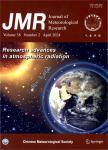Heavy Rainfall Ensemble Prediction:Initial Condition Perturbation vs Multi-Physics Perturbation
Heavy Rainfall Ensemble Prediction:Initial Condition Perturbation vs Multi-Physics Perturbation作者机构:National Meteorological Center Chinese Academy of Meteorological Sciences
出 版 物:《Acta meteorologica Sinica》 (气象学报)
年 卷 期:2009年第23卷第1期
页 面:53-67页
核心收录:
学科分类:07[理学] 070601[理学-气象学] 0706[理学-大气科学]
基 金:Supported by the National Natural Science Foundation of China under Grant No.40675061,the project from Ministry of Science Technology of China under Grant Nos.2004DIB3Jl19 and GYHY200706001 the key project from Meteorological Bureau of Sichuan Province
主 题:heavy rainfall ensemble prediction initial condition perturbation multi-physics perturbation
摘 要:Mesoscale ensemble is an encouraging technology for improving the accuracy of heavy rainfall predictions. Occurrences of heavy rainfall are closely related to convective instability and topography. In mid-latitudes, perturbed initial fields for medium-range weather forecasts are often configured to focus on the baroclinic instability rather than the convective instability. Thus, alternative approaches to generate initial perturba- tions need to be developed to accommodate the uncertainty of the convective instability. In this paper, an initial condition perturbation approach to mesoscale heavy rainfall ensemble prediction, named as Different Physics Mode Method (DPMM), is presented in detail. Based on the PSU/NCAR mesoscale model MM5, an ensemble prediction experiment on a typical heavy rainfall event in South China is carried out by using the DPMM, and the structure of the initial condition perturbation is analyzed. Further, the DPMM ensem- ble prediction is compared with a multi-physics ensemble prediction, and the results show that the initial perturbation fields from the DPMM have a reasonable mesoscale circulation structure and could reflect the prediction uncertainty in the sensitive regions of convective instability. An evaluation of the DPMM ini- tial condition perturbation indicates that the DPMM method produces better ensemble members than the multi-physics perturbation method, and can significantly improve the precipitation forecast than the control non-ensemble run.



